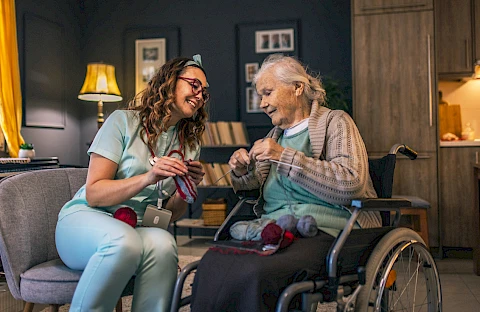
Beyond attending to their physical health, ensuring senior well-being also involves recognizing and addressing the challenges of their caregivers. Caregiver burnout is a prevalent and often overlooked concern that can significantly impact the health and happiness of our senior loved ones. Understanding the dynamics of caregiver burnout and implementing strategies to mitigate it will ensure caregivers remain healthy, supported, and capable of offering the best possible care.
What Is Caregiver Burnout?
Caregiver burnout is a state of emotional, mental, and physical exhaustion that can develop from the responsibilities and pressures associated with caring for a senior. This burnout often materializes due to neglect of the caregiver's own needs and mental health. It can lead to feelings of fatigue, guilt, and sometimes resentment. It usually develops gradually and may go unnoticed until it reaches a critical level.
The Repercussions of Caregiver Burnout
Caregiver burnout doesn't just affect the caregivers. It has far-reaching consequences for the seniors they support. Here are a few ways seniors can be affected:
Decline in Overall Health
A caregiver suffering from burnout may unintentionally neglect the needs of the senior they care for. They may miss essential medications, provide inadequate nutrition, or allow poor hygiene. These oversights can lead to a decline in a senior's health conditions.
Lack of Emotional Support
A burned-out caregiver may struggle to provide emotional support effectively. They may be impatient, less attentive, and fail to empathize with the seniors they care for. Emotional support from caregivers is crucial as the lack of it can diminish the quality of life of seniors.
Added Stress
Seniors may feel a sense of guilt or stress, knowing that their caregiver is undergoing hardships due to their care needs. These feelings are even more pronounced when the caregiver is a family member. Such emotional burdens can increase the risk of anxiety and depression in seniors, impacting their mental health.
Less Socialization
A caregiver in the throes of burnout may not have the time or energy to facilitate social activities for the senior. This can result in the senior experiencing feelings of isolation and loneliness. Caregivers also provide essential companionship to seniors. If they are stressed out, the quality of this companionship can suffer.
The Impact of Burnout on Family Caregivers
Caregiver burnout can be particularly potent when the caregiver is a relative. Family caregivers often face an added layer of pressure trying to balance their personal lives, professional commitments, and caregiving responsibilities. Moreover, the emotional investment in caring for a loved one amplifies the risk of burnout.
Tips to Prevent Caregiver Burnout
As a senior, you can help minimize caregiver burnout by encouraging them to acknowledge their needs. Ensure they take regular breaks, maintain a healthy lifestyle, and get sufficient rest. Support them in engaging in hobbies and social activities to help them recharge. Expressing your appreciation and understanding goes a long way in boosting their morale. Consider dividing tasks among other family members or hiring professional help to ease their burden. This ensures your caregiver remains healthy and capable of providing the best care possible.
Get In-Home Support From Senior Helpers
Caregiver burnout is a significant issue that directly impacts senior health and well-being. Senior Helpers Northwest Indiana offers comprehensive, in-home senior care services, including respite care for caregivers. If you’re in Crown Point, Gary, Hammond, or Lake County areas, don't hesitate to contact us to learn more about our services!